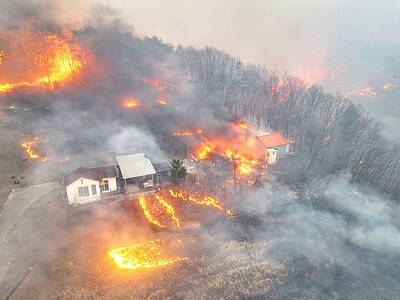Stay and endure a life of privation and oppression or escape and risk being sold into sexual slavery: That is the stark choice facing many women in North Korean, bestselling author and activist Lee Hyeon-seo warned.
The daughter of a military official, she is not your typical defector — it was curiosity not desperation that pushed her to venture beyond North Korea’s borders.
Almost 20 years on, she has become a powerful voice of dissent, laying bare the reality of life under the totalitarian regime in her memoir The Girl with Seven Names.

Photo: AFP
Now she is campaigning for greater protection for North Koreans who manage to flee — particularly women — warning that many are captured in China and sold into prostitution or end up in forced marriages.
“All but the lucky few will live the rest of their lives in utter misery,” she said. “They will be repeatedly raped day in and day out by an endless supply of customers who enrich their captors at their expense.”
Horrified by “survivor testimony,” she is launching a new non-governmental organization, North Star NK, which has agents in the field across Southeast Asia and China helping those trafficked in the sex trade to escape.
“They are so humiliated and broken, they don’t want to speak out, so I decided I should try to help,” Lee said.
The Tumen and Yalu rivers act as a border with China. In some parts the water is navigable, while in winter they are frozen over completely.
For many, the physical act of crossing is the easiest bit. There is no asylum once they reach the other side, they are regarded as illegal immigrants, and face deportation if caught and then severe punishment in North Korea.
The women are in an incredibly vulnerable position, Lee said. They have little choice but to trust the brokers smuggling them out, but there is no one to turn to if things go wrong.
Lee herself narrowly avoided being forced into the sex trade when she crossed into China. She was told she was being trained to work in a hair salon, but on arrival she discovered it was a brothel and managed to run away.
Her own story is one of remarkable survival against the odds. From public executions and corpses lying on the streets to family gatherings and playing with friends, Lee’s memories of her childhood are a patchwork of the ordinary and the horrifying — and yet, she said, it was all normal in North Korea.
“The sad truth for most North Koreans is that they are brainwashed to think that their complete lack of freedom and human rights is normal,” she said.
For her the coil of indoctrination unraveled gradually. She grew up on the border — the neon lights of China visible just across the Yalu River.
“My country was completely dark, even though we were supposedly superior,” she said. “Living so close to China also allowed me to secretly watch Chinese TV channels, which opened my eyes to a whole new world.”
A nationwide famine, known as the “Arduous March,” also forced her to reconsider the rhetoric of the regime.
“In my hometown of Hyesan I could see dead bodies on the streets. The smell of decomposing flesh made me feel sick and gave me goosebumps,” she said.
It is estimated hundreds of thousands died.
Lee was just 17 when she illegally crossed the river into China, planning on just a short visit. Instead, she ended up on a decade-long odyssey, during which she assumed multiple identities, evaded state crackdowns on North Koreans, and endured betrayals and beatings.
“I’ve had many low points throughout my life, but I remember crying so much when I was living by myself in China, because I never thought I would see my family again. I hated myself,” she said.
In 2008, she traveled to Seoul and was granted asylum, before going on to guide her family from North Korea to freedom, too. She is happily married to an American, who she met in the city.
Now she is determined to use her experiences to bring about change.
“It’s essential that the people who have been oppressed speak out. It’s the most effective way to compel the international community to help,” she said.

A French-Algerian man went on trial in France on Monday for burning to death his wife in 2021, a case that shocked the public and sparked heavy criticism of police for failing to take adequate measures to protect her. Mounir Boutaa, now 48, stalked his Algerian-born wife Chahinez Daoud following their separation, and even bought a van he parked outside her house near Bordeaux in southwestern France, which he used to watch her without being detected. On May 4, 2021, he attacked her in the street, shot her in both legs, poured gasoline on her and set her on fire. A neighbor hearing

DEATH CONSTANTLY LOOMING: Decades of detention took a major toll on Iwao Hakamada’s mental health, his lawyers describing him as ‘living in a world of fantasy’ A Japanese man wrongly convicted of murder who was the world’s longest-serving death row inmate has been awarded US$1.44 million in compensation, an official said yesterday. The payout represents ¥12,500 (US$83) for each day of the more than four decades that Iwao Hakamada spent in detention, most of it on death row when each day could have been his last. It is a record for compensation of this kind, Japanese media said. The former boxer, now 89, was exonerated last year of a 1966 quadruple murder after a tireless campaign by his sister and others. The case sparked scrutiny of the justice system in

DITCH TACTICS: Kenyan officers were on their way to rescue Haitian police stuck in a ditch suspected to have been deliberately dug by Haitian gang members A Kenyan policeman deployed in Haiti has gone missing after violent gangs attacked a group of officers on a rescue mission, a UN-backed multinational security mission said in a statement yesterday. The Kenyan officers on Tuesday were on their way to rescue Haitian police stuck in a ditch “suspected to have been deliberately dug by gangs,” the statement said, adding that “specialized teams have been deployed” to search for the missing officer. Local media outlets in Haiti reported that the officer had been killed and videos of a lifeless man clothed in Kenyan uniform were shared on social media. Gang violence has left

‘HUMAN NEGLIGENCE’: The fire is believed to have been caused by someone who was visiting an ancestral grave and accidentally started the blaze, the acting president said Deadly wildfires in South Korea worsened overnight, officials said yesterday, as dry, windy weather hampered efforts to contain one of the nation’s worst-ever fire outbreaks. More than a dozen different blazes broke out over the weekend, with Acting South Korean Interior and Safety Minister Ko Ki-dong reporting thousands of hectares burned and four people killed. “The wildfires have so far affected about 14,694 hectares, with damage continuing to grow,” Ko said. The extent of damage would make the fires collectively the third-largest in South Korea’s history. The largest was an April 2000 blaze that scorched 23,913 hectares across the east coast. More than 3,000